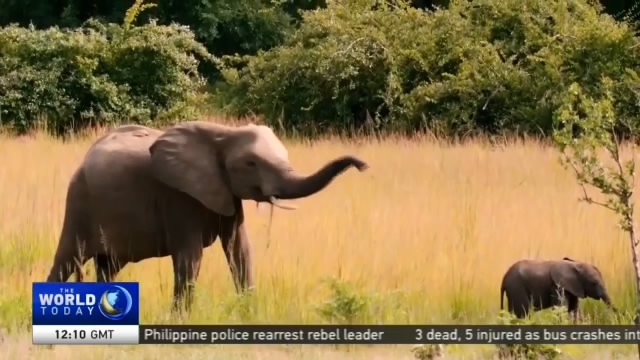
20:32, 01-Feb-2018
Benin National Park: National Geographic Society to help with revitalization project

Benin and the National Geographic Society have announced a 23-and-a-half million dollars partnership to protect and revitalize one of the West African country's national parks. Pendjari National Park -- which is part of the last large natural reserve in the region -- is home to elephants and lions, but faces threats from poachers and the local population. It's hoped the agreement with the international non-profit agency will help the country develop the park for eco-tourism. CGTN's Paul Barber reports from London.
Spread over nearly five thousand square kilometers - Pendjari National Park in Benin may be one of the world's most important wildlife reserves, you've never heard of. It's West Africa's largest remaining intact ecosystem, and home to unique populations of elephants, lions, leopards and cheetahs. But it's in serious peril due to poaching, poor management and climate change.
PETER FEARNHEAD CEO, AFRICAN PARKS "When you have scarce resources that have value, people want to harness those resources. So whether it's ivory from elephants or rhino horn from rhino or whether it's bushmeat for protein or even charcoal and wood for providing energy needs, these parks have those resources int them so if you don't have proper governance in place and proper management then those resources are utilized and utilized unsustainably until there's nothing left."
But that could all be about to change. Benin's government has announced a 27-and-a-half million dollars partnership with the National Geographic Society, the African Parks NGO and the Wyss Foundation to secure Pendjari's future.
JONATHAN BAILLIE CHIEF SCIENTIST, NATIONAL GEOGRAPHIC SOCIETY "National Geographic has a unique role in that we can come is and we can help with the science and we can help with the technology in terms of monitoring and the surveillance and we can amplify the message in a way that's unique to Nat Geo."
Announcing the partnership in London, Benin's foreign minister said the conservation effort will be combined with a drive to increase eco-tourism, an un-tapped resource that will create plentiful jobs.
AURELIEN AGNENONCI BENIN MINISTER OF FOREIGN AFFAIRS "It's important for us to make sure that this belongs to the common heritage of the world by making sure that the biodiversity is preserved, by making sure that the population living there is benefiting."
Getting tourists into the country and to Benin's natural wonders requires better infrastructure - and the government describes China as it's number one collaborator on that front.
AURELIEN AGNENONCI BENIN MINISTER OF FOREIGN AFFAIRS "They are an important partner for us, we have an excellent relationship and we are happy to have them as a friend to our country."
PAUL BARBER LONDON "Benin knows it isn't big but with international partnerships such as this one with National Geographic, it hopes to put the country firmly on the map. Not only to boost its economy but to help save one of Africa's most important ecosystems. Paul Barber, CGTN, London."

SITEMAP
Copyright © 2018 CGTN. Beijing ICP prepared NO.16065310-3
Copyright © 2018 CGTN. Beijing ICP prepared NO.16065310-3